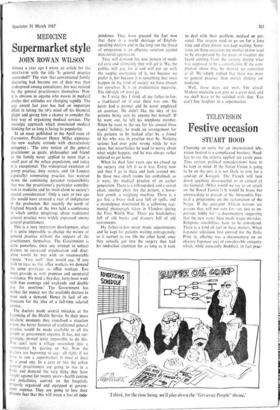Supermarket style
MEDICINE JOHN ROWAN WILSON
Almost a year ago I wrote an article for the SPECTATOR with the title 'Is general practice
outmoded?' The view that conventional family doctoring had become out of date was then widespread among consultants, but was resisted by the general practitioners themselves. Now
it is obvious to anyone who moves in medical circles that attitudes are changing rapidly. The
pay award last year has had an important effect in taking the GP's mind off his financial plight and giving him a chance to consider the best way of organising medical services. The nostalgic approach which dominated medical thinking for so long is losing its popularity.
In an essay published in the April issue of Encounter, Professor Henry Miller expresses the new realistic atittude with characteristic pungency: 'The cosy notion of the general practitioner as guide, philosopher and friend to the family never applied to more than a small part of the urban population, and today it is exceptional. The widespread extension of group practice, duty rosters, and (in London especially) commuting practice, has watered down the continuing personal responsibility that was the practitioner's particular contribu- tion to medicine and his main claim to society's special consideration.' Only a year or two ago this would have aroused a roar of indignation in the profession. But recently the north of England branch of the BMA held a conference in which similar misgivings about traditional general practice were widely expressed among general practitioners.
This is a very important development, since it is quite impossible to change the nature of general practice without the support of the practitioners themselves. The Government is quite powerless, since any attempt to subject doctors to increased organisation and disci- pline would be met with an unanswerable riposte. 'Very well,' they would say, 'if you wish to treat us like office workers we demand the same privileges as office workers. You must provide us with premises and secretarial assistance. We need a five-day, forty-hour week with free evenings and weekends and double Pay for overtime.' The Government has neither the money nor the available doctors to meet such a demand. Hence its lack of en- thusiasm for the idea of a full-time salaried service.
The doctors made several mistakes at the beginning of the Health Service. In their more idealistic moments they visualised a situation IA here the better features of traditional general practice would be made available to all the people at government expense. It has, not sur- prisingly, proved quite impossible to do this. You can't turn a village sweetshop into a supermarket by passing an Act. Now the doctors are beginning to say: all right, if we have to run a supermarket, it must at least be a good one. In a year or two the urban general practitioners are going to rise in a body and demand the very thing they have fought against for twenty years—health centres and polyclinics, centred on the hospitals, properly organised and equipped at govern- ment expense. They are going to lose their chronic fear that this will mean a loss of lade-
pendence. They have grasped the fact now that there is a world shortage of English- speaking doctors and in the long-run the threat of emigration is an effective sanction against ministerial oppression.
They will demand this new pattern of medi- cal care and ultimately they will get it. We, the public, will pay for it and will put up with the aseptic anonymity of it, not because we prefer it, but because it is something that must happen in the kind of society we have chosen for ourselves. It is an evolutionary necessity. The old-style GP must go.
As I write this I think of my father-in-law, a traditional GP if ever there was one. He never had a partner and he never employed an assistant. He didn't like the idea of his patients being seen by anyone but himself. If he went out, he left his telephone number. When he went to the sea for his annual three weeks' holiday, he made an arrangement for his patients to be looked after by a friend of his who was in practice near by. Nothing serious had ever gone wrong while he was away, but nevertheless he used to worry about what might happen, and he was always rather relieved to get home.
When he died four years ago we closed up the surgery and left it as it was. Every now and then I go in there and look around me. In those two small rooms lies embalmed, as it were, the medical practice of an earlier generation. There is a roll-top desk and a swivel chair, another chair for the patient, a horse- hair couch, a weighing machine. There is a gas fire, a brass shell case full of spills, and a mantelpiece dominated by a yellowing regi- mental photograph taken in Flanders during the First World War. There are bookshelves full of old books and drawers full of old instruments.
My father-in-law never made appointments and he kept his patients waiting outrageously, so it seemed to me. On the other hand, once they actually got into the surgery they had his undivided attention for as long as it took to deal with their problem, medical or per- sonal. The surgery used to go on for a long time and often dinner was kept waiting. Some- times on those occasions my mother-in-law used to be exasperated by the peals of laughter she heard coming from the surgery during what was supposed to be a consultation. If she com- plained about this, he showed no contrition at all. He simply replied that there was more to general practice than merely dishing out medicine.
Well, those days are over, I'm afraid. Modern medicine can give us a great deal, and we shall have to be satisfied with that. You can't buy laughter in a supermarket.






























 Previous page
Previous page